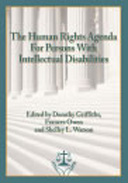"It is crucial to treat a person with a disability as the subject of human rights – that is, as a person who has a right, and who can claim it."

 |
The Human Rights Agenda For
Persons With Intellectual Disabilities edited by Dorothy Griffiths,
Frances Owen, and Shelley L. Watson NADD Press
book review by RJM Terrado
The Human Rights Agenda is an edited collection of materials from the 2010 Human Rights and Intellectual Disabilities Conference in Niagara Falls, Ontario. It is composed of 10 interesting and informative chapters useful to the understanding of intellectual disabilities. It explores uncomfortable, undiscussed or sometimes neglected issues about the condition. It identifies and shares salient elements paving for an effective and sensitive discussion of issues raised. The book offers a ring of truth by probing on the experiences of people with intellectual disabilities in a way that holds the interest of the readers.
Right on the foreword by Dave Hingsburger and the introductory chapter by the editors, the book engages the reader by highlighting the need to uphold the commitment to equality and non-discrimination of people with intellectual disabilities. The book proposes many rights as it questions the gap between their needs and actual provisions and lays down possible solutions through the critical evaluation of the subject's current condition. It also draws the attention of the readers to the prevailing attitudes toward the sexuality of persons with disabilities and parents' predisposition to become the "new obstacles or institutional walls" to sexual expression.
The orientation, depth and presentation of arguments in the book enliven a discussion that could have been dry and dull. It offers real-life experiences, theories, and critical assessments design to promote discussions about the rights of the intellectually disabled in terms of living independently and being included in community, freedom from exploitation, violence and abuse, and respect for privacy. The book is a must-read for agencies supporting the rights of people with special needs, professionals in the field of special education, speech pathology, social work and clinical psychology, and anyone with loved ones diagnosed with intellectual disabilities.